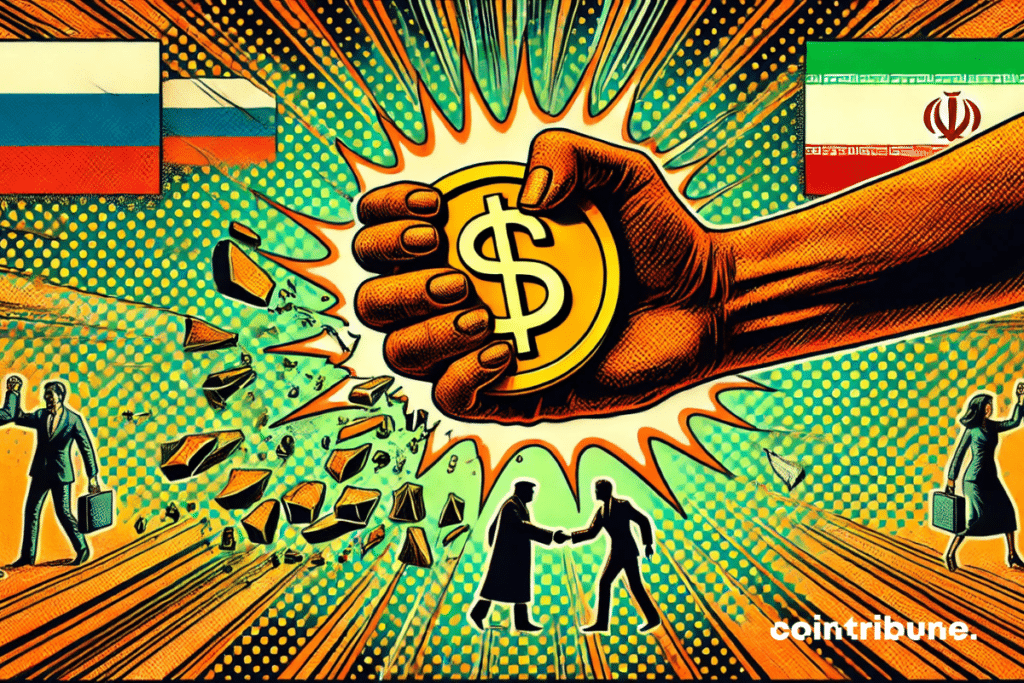BRICS Power Play : Russia And Iran Lead The Charge Against The Dollar
The global economic dynamics are evolving, and the hegemony of the US dollar seems to be wavering. Two influential members of the BRICS alliance, Russia and Iran, have just announced a major shift: the complete abandonment of the dollar for their trade exchanges. While this decision reflects a desire for economic sovereignty in the face of external pressures, it could also pave the way for a profound upheaval of international financial balances.

A partnership strengthened by dedollarization
Russia and Iran, hit by heavy international economic sanctions, have consolidated their cooperation through the exclusion of the US dollar from their trade exchanges. “We have concluded a monetary agreement with Russia and completely eliminated the dollar. From now on, we only use the ruble and the rial,” indicates Mohammad Reza Farzin, governor of the Iranian central bank. This initiative marks a notable acceleration in 2024, where 96 % of transactions between the two countries are conducted in local currencies, an increase of 12.4 % compared to the previous year.
Furthermore, Russia has integrated the Iranian payment system Mir, allowing Iranian citizens to access their funds directly via ATMs in Russia. This system was designed to replace the SWIFT network, largely controlled by the United States, and to offer a sustainable alternative in the face of restrictions imposed by Washington.
A global strategy and its international implications
This bilateral partnership fits within a broader dedollarization strategy promoted by the BRICS group. While Western sanctions aimed to economically isolate Russia, the Kremlin has intensified efforts to persuade other nations to abandon the dollar in favor of local currencies. This trend, already followed by several emerging economies, could amplify the dollar’s loss of influence in global markets.
The implications of this evolution extend beyond the BRICS. A decline in global demand for the dollar risks disrupting traditional supply and demand mechanisms, which could heighten inflationary pressures in the United States. For emerging countries, this initiative offers a possibility to reduce their dependence on fluctuations of the greenback and economic sanctions.
Finally, this movement could initiate a new era of international financial relations, where regional systems and bilateral exchanges in local currencies would gradually replace dollar-dominated structures. This strategy could inspire other countries to explore monetary alternatives, thus redefining the global economic landscape.
Ultimately, the decision by Russia and Iran to definitively turn their backs on the US dollar illustrates a desire for autonomy in the face of geopolitical challenges. While this change represents a symbolic victory for the BRICS, it could also raise new questions about the future of global trade and the role of sovereign currencies in a rapidly changing financial system.
Maximize your Cointribune experience with our "Read to Earn" program! For every article you read, earn points and access exclusive rewards. Sign up now and start earning benefits.
Diplômé de Sciences Po Toulouse et titulaire d'une certification consultant blockchain délivrée par Alyra, j'ai rejoint l'aventure Cointribune en 2019. Convaincu du potentiel de la blockchain pour transformer de nombreux secteurs de l'économie, j'ai pris l'engagement de sensibiliser et d'informer le grand public sur cet écosystème en constante évolution. Mon objectif est de permettre à chacun de mieux comprendre la blockchain et de saisir les opportunités qu'elle offre. Je m'efforce chaque jour de fournir une analyse objective de l'actualité, de décrypter les tendances du marché, de relayer les dernières innovations technologiques et de mettre en perspective les enjeux économiques et sociétaux de cette révolution en marche.
The views, thoughts, and opinions expressed in this article belong solely to the author, and should not be taken as investment advice. Do your own research before taking any investment decisions.